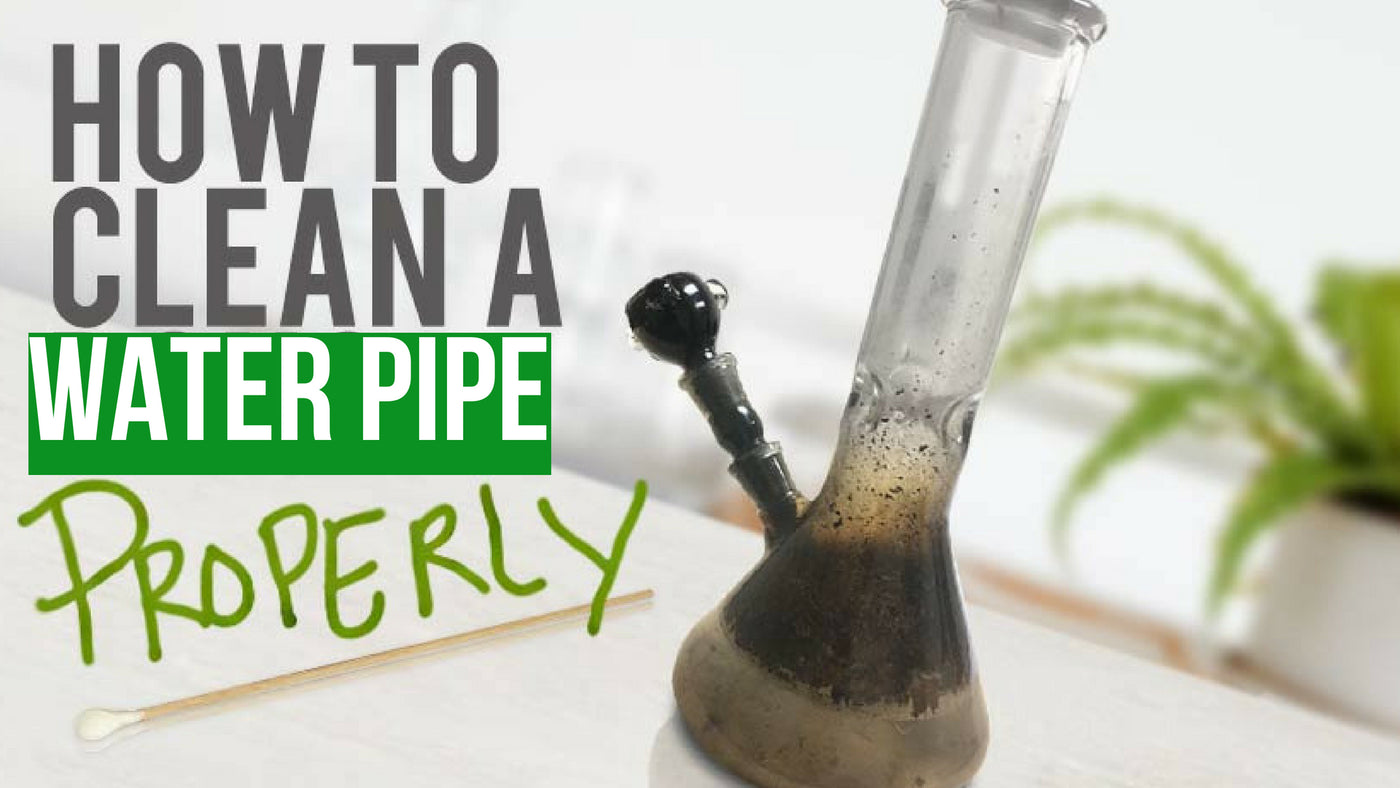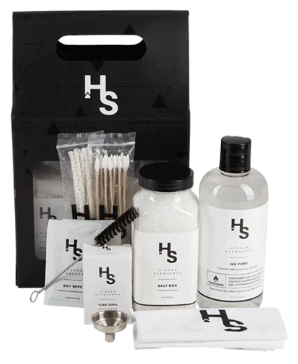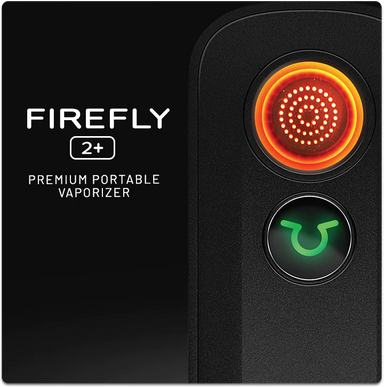Keep your glass clean for the best flavor and optimal performance. Follow this guide to find out the best way to clean your glass water pipes with a little help from our friends at Higher Standards.
We'll be using the Higher Standards Supreme Clean Kit, which features everything you need to clean even the most grungy of water pipes.
Check out our cleaning products:
- Resin Rag wipes to help with spot cleaning and drying.
- Pipe Dreamz fine bristles.
- Pipe Stix to aid in dislodging dry herb.
Let's dive in to how to properly clean your water pipe!
Overview
The process for how to best clean a bong is relatively simple, using a solvent and an abrasive material, even the most built-up of grimes can be removed. Care and maintenance of your glass, especially premium or heady glass, will promote longer life and better flavor. Not to mention the fact that dirty bongs make your living space look like a frat house whose charter was revoked.
What Do You Need To Clean a Water Pipe?
- Solvent (Isopropyl Alcohol) To break down gunk and sticky substances
- Exfoliant (Coarse Salt) To speed up cleaning and cleanse hard-to-reach areas
- Water (Distilled) For rinsing and refill of your glass pipe
Solvent
Dirtier water pipes require heavier firepower, cut the crud with 99% pure Isopropyl alcohol
While there are many products out there marketed directly on how to clean a water pipe, the best method continues to be a coarse grain salt combined with Isopropyl alcohol. This method will not impart any unwanted flavors on your water pipe or leave behind any chemicals which may be harmful to inhale.
The purer the Isopropyl alcohol, the more effective it will break down resins. Purer Isopropyl alcohol will also leave behind zero oil traces. While most store-bought iso alcohol will top out around 91%, Higher Standards' Iso Pure boasts 99% purity for the utmost quality cleaning.
Why Is Iso the Best Way to Clean a Water Pipe?
Isopropyl alcohol is used by aficionados for its inert nature. Not only is this solvent powerful at removing resin and gunk from your water pipe, but it possesses properties which make it a perfect pair for glass. First off, it absorbs any excess moisture, lessening the chance that your water pipe may develop harmful bacteria or mold. It also evaporates quickly, so there will not be lingering cleaning materials on your water pipe.
Exfoliant
Eviscerate resin from your piece with a coarse salt
To aid in removing grime and polishing your glass, an exfoliant should be a part of your water pipe cleaning regimen. The abrasive nature of an exfoliant will also give you the necessary elbow grease to clean out hard to reach areas such as the joints where your glass parts meet and things like percolators and ash catchers.
Plant material can be one of the harder elements to clean from your water pipe. When ash and other organic material gets into the components of your water pipe, it can be covered in layers of resin, which will essentially cement it in place. The use of an exfoliant applies a sandpaper-like friction to remove these set-in particles.
While there are any number of exfoliants one could use, coarse rock salt is preferred for its efficient removal of sticky substances. The coarser the salt, the better, this will remove even the stickiest of residues. Check out Salt Rox for the connoisseur's choice of cleaning salts. Fine grain salts like Morton’s can be used, however, they are less effective than coarse rock salts.
The reason for this has to do with the molecular nature of salt itself. Sodium chloride, the salt compound, dissolves in water quite readily. This solubility is particularly apparent when using smaller grain salts. They will dissolve completely, removing the exfoliant from the equation. Course salts and rock salts can combat this. By nature of their relative size, they are much slower to dissolve. This allows for more removal of grime from your water pipe before the salt is completely dissolved.
Water
Tap water is for plebs, but it can be used to rinse your water pipes
Good ole H2O is your water pipe’s best friend, not only for filling it but for gently rinsing before and after cleaning. While any water will do, your water pipe deserves the best. So why not use purified or distilled water? Distilled water is perfect for cleaning operations as it is relatively free of impurities.
While tap water can work to rinse your water pipe clean of debris, most tap water will contain a large number of minerals. Water filters can be used, such as a Britta or similar water filter. However, these types of water filters are often breeding grounds for bacteria, which you definitely don’t want to introduce to your water pipe.
Process
While there is more than one way to clean a water pipe, the following operating procedure is a great way to take a systematic approach to cleaning your glass water pipe and keeping it clean. So, every time your water pipe gets gunky, do the following:
The Best Way to Clean a Water Pipe:
- Empty any remaining water from your water pipe
- Rinse to remove any larger debris or residue from old water
- Add Isopropyl alcohol
- Add Salt
- Cover the stem and tube of your water pipe with Tube Top Stoppers
- Shake vigorously (but carefully)
- Rinse with water
Disassembly
Break it down, bag it up, clean it up.
Removing any pieces that are not fixed to the water pipe is an important step to avoid accidental breakage. Countless bowls and stems have been destroyed through silly mishaps, like attempting to pour water out of the water pipe while the stem is still inside. This can easily be avoided by keeping these smaller pieces separate.
Place these items in separate, sealable plastic bags to clean them. You will need to clean these items separately from your water pipe. We recommend using separate bags for each item, as the small pieces could break or chip if they bump each other.
These items will follow the same cleaning procedure as outlined here, only in smaller bags for safekeeping.
Empty Water
While water is what filters the smoke in your water pipe, it can also contribute to grime and promote growth of fungi and bacteria. For this reason, you should empty your water after each session, or just at the end of the day.
By changing the water regularly, you would be surprised how much cleaner your water pipe will stay, and how much better the flavor will be each session. Don’t wait for the water pipe water to get smelly and change color!
Rinse
A good rinse is a great way to get started cleaning your water pipe, and if the water pipe is only lightly soiled, this may be all the cleaning it needs. We recommend using distilled water for the final rinse. However, tap water is generally fine for the initial rinse as the Isopropyl alcohol will clean any contaminants that may be lurking in your tap.
Fill your water pipe with warm water. You can gently heat distilled water in a pot on the stove or use the hottest water your tap provides. Then carefully agitate your water pipe or glass pipe as much as you comfortably can.
You want to be careful here, because slippery hands can lose a water pipe quickly. This should remove some of the resin and deposits and any residue left behind from dirty water. Your water pipe is now ready for a deep cleaning.
Add Isopropyl Alcohol
Now you’re ready to remove any set-in grime and get that glass looking new again. Before working with a solvent like isopropyl make sure that you are in a safe environment to be doing so.
Take a quick check to make sure that you are in a well-ventilated area. Isopropyl is also flammable, so avoid lighting up while cleaning your smoking piece.
The amount of Isopropyl alcohol you add to your water pipe will largely be dependent on the volume of water your water pipe holds. Personally, we fill our water pipes and glass pipes to just below the fill line where we would put water. However, the purer your isopropyl alcohol, the less you will have to use.
Add Salt
Your water pipe will be so clean, you'll be catching salty looks
Now that your solvent has been added to the water pipe, let’s get the exfoliant in there to polish away residue. Add a healthy pour of salt to the alcohol mixture in your pipe.
The amount of salt to add will also be dependent on the volume of your water pipe. Keep in mind that some of the salt will dissolve in the alcohol, so add accordingly. You want enough to exfoliate any of the residue on the water pipe, while still giving room to agitate the salt and Iso solution.
Cover the Stem And Tube of Your water pipe
Plug it up to avoid spills
To prevent spilling your exfoliant and solvent all over the place, you’ll want to cover up the stem and tube. There are any number of ways to accomplish this. You could use a wine cork (gently) in the stem and use your hand to cover the tube. You could use paper towels and plastic wrap, held in place with rubber bands.
For hassle-free maintenance, the Supreme Cleaning Kit from Higher Standards includes Tube Tops. These silicone stoppers will keep your alcohol and salt solution in place without having to rig anything together.
Shake Vigorously (But Carefully)
Shake it, don't break it.
- Make sure to use Tube Tops Silicone Stoppers to prevent spills.
Now it’s time to put your solution and exfoliant to work. While being careful not to drop your precious glass, shake away the grime. Depending on the amount of buildup in your water pipe, this could take a while. Just be patient and feel free to give your arms a break if they can’t handle it.
If after 10-15mins of vigorous shaking, there is still grime, we recommend letting the Iso soak for a few hours to overnight.
Final Rinse
By now your water pipe or glass pipe should be as clean as the day you bought it. Aren’t you proud? Now it’s time to rinse away your cleaning solution and prepare your water pipe for use.
We would recommend removing whatever obstruction you used to keep the stem from spilling. Empty your combination of rock salt and Isopropyl alcohol into the sink.
This is where distilled water will really come in handy, its relative lack of contaminants will keep your glass from getting cloudy. Tap water may once again be used, but you might want to hit your water pipe with a cotton wipe or Dab Rag to give it a polish once dried.
Polish your water pipe like a pro with these sick Resin Rags
***For water pipes that are extremely dirty, or water pipes with percs or hard to reach nooks and crannies you may have to repeat the last few steps several times to get the glass to new condition.***
Why Clean a Water Pipe?
It is important to clean your water pipe not only for aesthetic reasons but also for your health. While water can filter your smoke, it will collect ash and the resin and the grime from stagnating water will build up. This buildup and resin not only leads to unwanted flavors, but also may contain hazardous byproducts that are not meant to be inhaled or exposed to the heat of smoking dry herbs.
A dirty water pipe can take a pleasurable smoking experience to a bad tasting, germ-filled nightmare. Let’s be honest, when you use a water pipe it’s generally in the presence of friends. While passing around from mouth to mouth, there are all sorts of germs and saliva left behind. While you may love your friends, you won’t love having their cold or worse.
Keep yourself and your friends safe, by maintaining a clean water pipe that preserves the flavors of your smoke and repels germs and other contaminants.
The Dangers of a Dirty Water Pipe
Warm, moist environments are breeding grounds for mold and bacteria. A dirty water pipe provides these exact conditions, putting you at risk for illness or even respiratory infections. Cleaning your water pipe regularly will help to prevent some unnecessary risks when enjoying your smoking blends.
When to Clean a Water Pipe
The frequency with which you clean your water pipe will largely be dependent on how often you are using it. However, there are some signs that your water pipe is ready for a cleaning:
- Bad smells
- Bad taste
- Dirty water
- Water residue along the fill line
- Dirty downstem
- Resin and plant matter in the body of the water pipe
If these conditions are present, it is most likely time to give your water pipe a cleaning. If you catch it early, it will significantly reduce your cleaning time as well as minimize your risk of contact with contaminants. In our opinion, it's always better to err on the side of caution if you believe your water pipe may need a cleaning, don’t hesitate. No one has ever smoked out of a water pipe that they thought was “too clean.” For Maintenance in between washing, it's recommended to use Pipe Stix cotton tips and Pipe Dreamz fine bristles for removing dense debris and smoother draw
What About Silicone Water Pipes?
Since this blog has been largely focused on glass pipes and water pipes, you’re probably wondering, “what about silicone?”
Not to worry, We’ll cover silicone water pipes, which are an increasingly popular option for those looking for dependable pieces.
One of the most significant advantages of silicone water pipes is resiliency. Silicone pipes and water pipes are virtually unbreakable, making them great smoking devices for the accident-prone. Since silicone is not transparent, it is also much more resistant to resinous deposits and unsightly tar. This generally allows users to go for longer periods of time between cleanings.
Though you may not be able to see resin and grime from the outside of your silicone water pipe, these devices still require care and maintenance. To preserve the fresh flavors of your herbal blends or the taste of your concentrates, you will want to keep your silicone water pipe fresh and clean. Silicone, like glass, will be susceptible to mold and bacteria if left uncleaned.
For easy maintenance of your silicone water pipe, it’s important to do some light cleaning after every usage. We would recommend emptying the water from your silicone water pipe or Sidecar rig, after every usage. This will prevent stagnant tastes from disrupting the terpene flavors of your concentrates or herbal blends. Taking even this simple step will prevent the buildup of pond scum, bacteria, and all sorts of other stuff you don’t want to be inhaling into your lungs.
Another piece of maintenance that you should perform after every usage is the clearing of debris from your bowl or quartz banger. You can use a cotton cloth or moist towel to gently scrub away any remaining plant material or resinous matter left behind. These simple steps will keep your silicone water pipe or rig tasting and performing great. When you need to perform deeper cleaning, you can follow the below procedure.
How to Clean a Silicone Water Pipe
Cleaning a silicone water pipe or rig is almost identical to cleaning a glass water pipe. All of the primary components are the same; you will want a solvent combined with an exfoliant to scrub away any sticky resins or residues which may impart negative flavors on your smoke or vapor. Follow these steps.
-
Empty any remaining water from your silicone water pipe
-
Gently brush any remaining plant material away from your bowl
-
Begin the washing process with a hot water rinse of your silicone water pipe
-
Add your solvent of choice (Isopropyl alcohol or dedicated silicone cleaner)
-
Add exfoliant
-
Agitate the exfoliant to polish away any resinous materials
-
Rinse with water & dry thoroughly
It’s important to know if your water pipe is 100% percent silicone or not. water pipes that are not 100% silicone may have plastics blends that will break down over time, or even emit harmful odors and fumes. For water pipes, rigs, and pipes that are 100% silicone, we recommend Eyce. Any pure silicone water pipe or pipe is safe to clean with Isopropyl alcohol using the methods described above.
However, there are dedicated silicone cleaners, which may be safer if you are unsure of the silicone content of your water pipe or rig. Besides being purpose-designed for silicone, many of them feature natural ingredients, which may be more appealing to some users.
Keeping your water pipe Clean
To lessen your cleaning amount you can take some steps to make sure that your water pipe stays clean. A little bit of prevention will offset some of the huge amounts of buildup. This may extend the amount of time between cleans.
To maintain your water pipe’s sparkly finish in between heavy cleans you can do the following:
- Use distilled water to fill your water pipe
- Change water after every session
- Only keep water in your water pipe when in use
- Rinse your water pipe and down stem with hot water after every use
Following these tips will keep your glass looking cherry and tasting great.
FAQ
Will peroxide clean a water pipe?
Peroxide is great for first aid applications and some light cleaning/disinfecting. However, it is not a great first choice for cleaning water pipes. While its antiseptic properties can remove some of the mold and bacteria it is not nearly as powerful as isopropyl alcohol.
Combining an exfoliant with hydrogen peroxide will make it somewhat more effective. However, this still may not be enough to remove set-in resin and plant material. The solution will also become less and less effective as it is exposed to oxygen.
Will vinegar clean a water pipe?
Vinegar is a great substance to promote natural cleaning for household applications. Though it will take much more time and effort than Isopropyl alcohol, it can be used. We would recommend heating the vinegar to a warmer temperature to help remove some of the resin and gunk.
If using vinegar to clean a water pipe be sure to only use distilled white vinegar and pair it with a coarse exfoliant. Also, the smell will be quite pungent and may leave behind odors on your water pipe. To combat this, make sure to thoroughly rinse your water pipe after cleaning with vinegar.
Can you clean a water pipe with nail polish remover?
This is not recommended. While acetone is a variation of isopropyl alcohol, it will promote oxidation of glass. Most Nail polishes are not 100% acetone and may leave behind scents and flavors which are not recommended to inhale. Using pure Isopropyl alcohol will ensure that the chemicals will evaporate quickly, leaving behind only clean glass without lingering chemicals.
Will bleach clean a water pipe?
While bleach is great for laundry and cleaning, we would not use it for cleaning a water pipe. Diluted bleach can disinfect your water pipe. However, when properly diluted it is not a solution that can break down heavy resins. We would not recommend exposing your hands or your water pipe to undiluted bleach.
Will vodka clean a water pipe?
Vodka is not recommended for cleaning your water pipe. Though vodka is a wonderful spirit for cocktails and the flavored liquor preferred by sororities across the united states, it’s not a substitute for Isopropyl alcohol. Vodka is a derivative of ethanol alcohol, which is not as suitable for cleaning applications.
Will mouthwash clean a water pipe?
Mouthwash is not meant to clean your water pipe. Anyone who’s ever used mouthwash without brushing can attest, it is not strong enough to break down plaque, let alone the sticky resins found in water pipes. If you’re trying to cover up the smell, it will not effectively do this either.
Trying to cover up the smell of a dirty water pipe with the mint of mouthwash will only make the problem worse. The best way to get rid of water pipe smell is by using isopropyl alcohol and rock salt to remove all resins and plant material.
Will dish soap clean a water pipe?
Dish soap can be used to clean a water pipe in a pinch. However it will take longer than other methods. We would still consider an exfoliant such as course rock salt to be a necessity when cleaning a water pipe with dish soap.
To clean your water pipe with dish soap, disassemble your water pipe and empty the water. Then apply a liberal amount of dish soap to your water pipe and pieces add the hottest water your tap can deliver. Allow to soak for 24 hours, you may then use a combination of rock salt, dish soap and hot water to clean your water pipe using the methods outlined above.
Got any other water pipe cleaning questions or tips?
Let us know if there are any questions you still have. Got a hot tip for making cleaning glass easier? Get at us in the comments below, and don't forget to check out our friends at Higher Standards.





